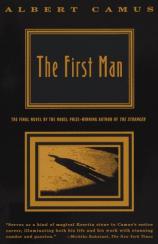The First Man
About the Book
The First Man
The questions, discussion topics, and author biography that follow are intended to enhance your group's reading of Albert Camus's The First Man. We hope they will give you a number of angles from which to approach this unfinished "autobiographical" novel by one of the twentieth century's most important literary figures. The incomplete manuscript of The First Man, which Camus had referred to as "the novel of my maturity," was found in a mud-spattered briefcase near the wreckage of the car in which Camus died in January of 1960, when he was forty-six. Partly a novel of childhood and partly an epic narrative of his beloved Algeria, The First Man was intended to re-create Camus's homeland-- then still a colony in a traumatic struggle for independence-- for the mainland French. The novel takes Jacques Cormery from birth to his years in the lycee, or secondary school, in Algiers. In a departure from the intellectual and philosophical weight of his earlier works, Camus wanted this novel to be "heavy with things and flesh." It is a novel of basic and essential things: childhood, schooldays, the life of the body, the power of the sun and the sea, the painful love of a son for his mother, the search for a lost father. But it is also about the history of a colonial people in a vast and not always hospitable African landscape; about the complex relationship of a "mother" country to its colonists; about the intimate effects of war and political revolution. Most important, The First Man brings Camus to life again, giving us a view of the man-- visceral and vulnerable-- that has never before been revealed.
The First Man
- Publication Date: August 6, 1996
- Paperback: 336 pages
- Publisher: Vintage
- ISBN-10: 0679768165
- ISBN-13: 9780679768166










